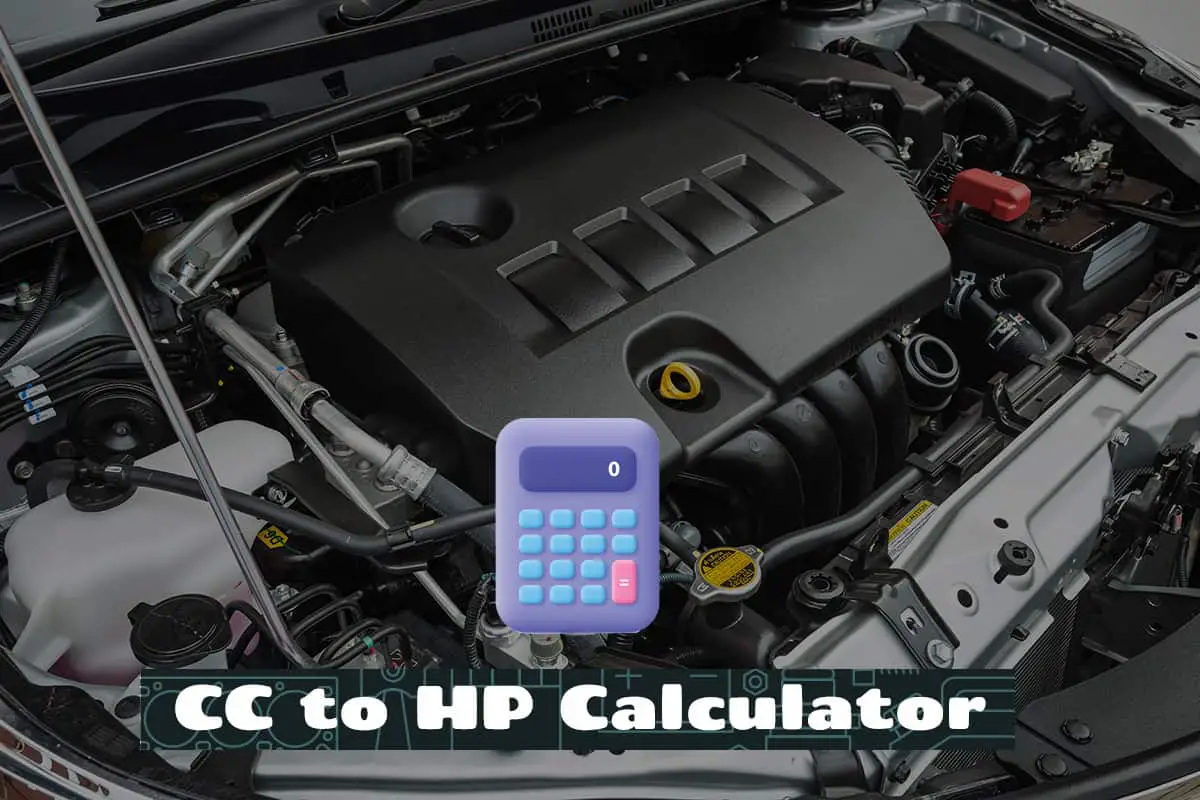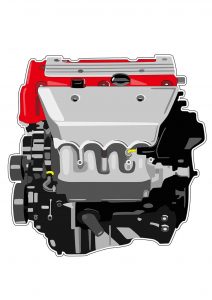Cubic centimeters and horsepower are frequently thrown around in car specification sheets and discussions, are crucial to grasp when determining a vehicle’s power and performance. But if you’re a real gearhead, you should know how to convert CC to HP and vice versa.
You can get a rough estimate of horsepower from cubic centimeters by dividing your car’s engine displacement (cc) by 15-17. For instance, a 2,000-CC engine will have a rough HP of between 117 and 133. Conversely, you can multiply your car’s HP by 15-17 to get a CC estimate.
This article will go into correlation between CC and HP, practical applications, examples, and how to use the calculator effectively.
The Relationship Between CC and HP
The relationship between cubic centimeters (CC) and horsepower (HP) is an important part of comprehending your car’s capabilities.
How CC Influences HP
CC is a unit of volume used to measure the size of a car’s engine. It signifies the total volume of all cylinders in the engine combined—the displacement. Greater CC often suggests a larger engine, capable of drawing in more air and fuel for combustion. This can lead to increased power output, hence, a higher horsepower.
HP, in this context, is the measure of an engine’s power output. One horsepower equates to the ability to move 550 pounds one foot in one second or 33,000 foot-pounds of work per minute. It’s a measure of how quickly a car can convert fuel into movement.
So, intuitively, it might seem like a larger engine (more CCs) would automatically mean more horsepower. However, this isn’t always the case due to engine efficiency and design.
Does a Higher CC Always Mean a Greater HP?
No, a higher CC doesn’t always mean greater HP. CC measures engine displacement. While larger engines can potentially generate more power, actual horsepower depends on engine efficiency, design, fuel type, and other factors. Two engines with the same CC can have different HP. Always refer to the vehicle’s specifications for accurate HP values.
Why the Ratio Between CC and HP isn’t Consistent
The ratio of CC to HP isn’t consistent across different engines, primarily because of three reasons: engine efficiency, engine design, and other performance factors.
- Engine Efficiency: Not all engines are equal in their ability to convert fuel into usable work. Engine efficiency, or thermal efficiency, refers to how well an engine transforms the potential energy in fuel into mechanical energy. Variations in efficiency result from different engine technologies and designs.
- Engine Design: The design of the engine also plays a significant role in determining the HP. Factors like the number of cylinders, their arrangement, the type of fuel injection, the cooling system, and turbocharging can affect the engine’s performance. For instance, a turbocharged engine can produce more HP than a non-turbocharged engine of the same CC.
- Other Performance Factors: Other aspects such as the car’s weight, aerodynamics, and the drivetrain can also influence how much HP a car effectively utilizes.
How to Convert CC to HP (and Vice Versa)
While there is no 100% accurate mathematical equation that can convert CC to HP due to the reasons listed above, you can get a pretty close estimate by dividing your car’s engine displacement (the CC rating) by 15 to 17.
To illustrate, a common CC rating for cars is 2 liters or 2,000 cubic centimeters. To get its HP rating, divide 2,000 by 15 and 17. The resulting figures are 117 and 113.
Another example is an 800-CC engine. Using this calculator, you will get an HP figure of between 47 and 53 HP.
Conversely, you can estimate your car’s engine displacement if you only have the HP figure. To do this, simply multiply the HP rating by 15-17. So, if your car’s engine is rated at 100 HP, the engine displacement may be around 1,500 and 1,700 CC.
Of course, the most accurate way to get the CC or HP rating of your car is by looking at the vehicle’s specs. You can flip through the car owner’s manual or perform a quick internet search for your car’s make and model.
CC to HP Ratio Chart
This chart can help you quickly convert CC to HP and back. If your car’s precise CC isn’t on this list, just look for the figure closest to it.
| CC (Engine Displacement) | HP (at 15 CC/HP) | HP (at 17 CC/HP) |
| 500 | 33.3 | 29.4 |
| 1000 | 66.7 | 58.8 |
| 1500 | 100 | 88.2 |
| 2000 | 133.3 | 117.6 |
| 2500 | 166.7 | 147.1 |
| 3000 | 200 | 176.5 |
| 3500 | 233.3 | 205.9 |
| 4000 | 266.7 | 235.3 |
| 4500 | 300 | 264.7 |
| 5000 | 333.3 | 294.1 |
| 5500 | 366.7 | 323.5 |
| 6000 | 400 | 352.9 |
Practical Applications for Converting CC to HP

Now that you know how to (roughly) convert CC to HP and back, when will you ever need to do this?
Informed Vehicle Purchasing
A vehicle’s engine displacement and horsepower significantly influence its performance, fuel efficiency, and driving experience. These parameters will help potential buyers in making more informed decisions.
For instance, a car with a larger engine displacement (higher CC) might offer more power (HP), but it could also consume more fuel. On the other hand, a smaller engine might provide better fuel efficiency but less power.
Performance Modifications
Car enthusiasts often engage in performance modifications to enhance their vehicles’ power output and efficiency, and knowing these calculations can help you implement the precise modifications you want.
For example, knowing that a larger engine displacement could potentially provide more power can guide decisions about engine swaps or upgrades. Similarly, understanding that design and efficiency influence HP more than mere engine size can lead to modifications like turbocharging or updating the fuel injection system.
Comparing Vehicles
Finally, the ability to convert CC to HP can be useful when comparing different vehicles. Since not all manufacturers list both CC and HP in their specifications, being able to estimate one from the other can provide a more comprehensive comparison.
For instance, if one car’s specs list its engine displacement and another’s list its horsepower, understanding the conversion can help compare these two vehicles on equal terms.






